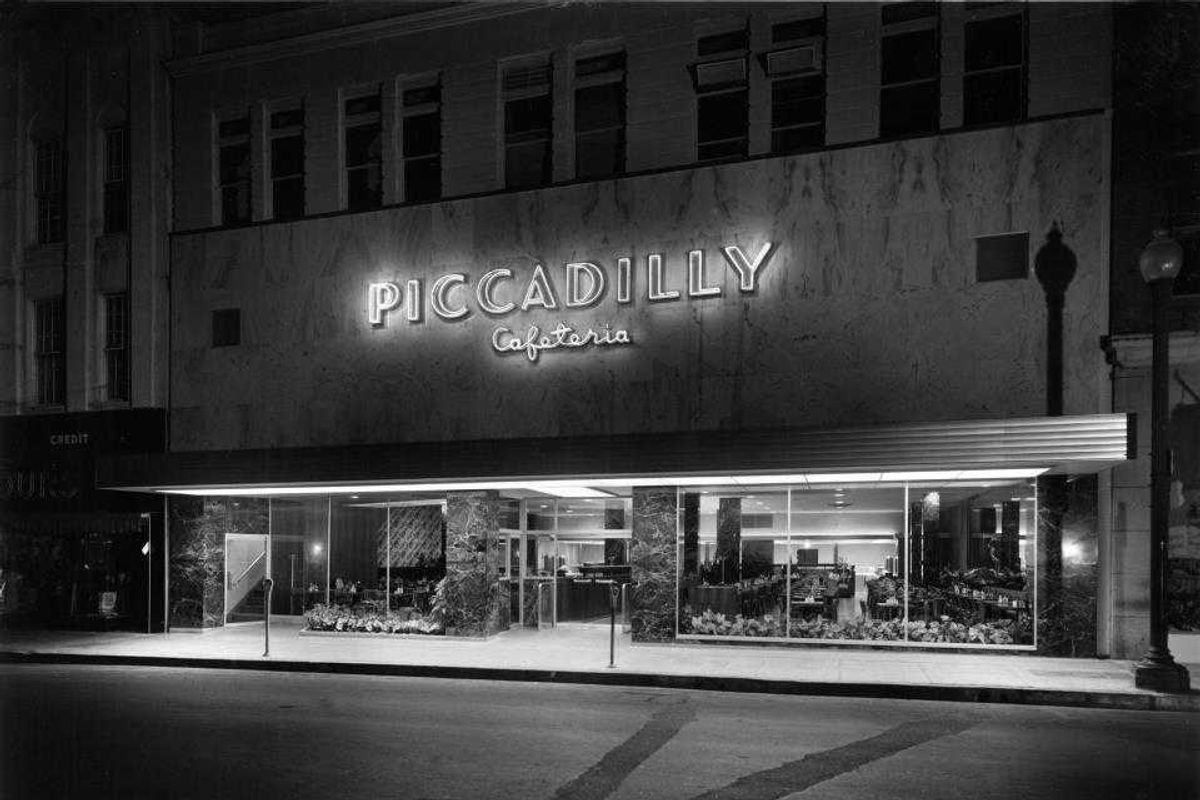Boomers who grew up eating at cafeteria-style restaurants in the 1970s share their favorite meals
"I fondly remember their beef liver and onions."
Baby Boomers share their favorite memories and foods from cafeteria-style restaurants, like Piccadilly.
Baby Boomers and Generation Jones (a microgeneration of Boomers born between 1954 and 1966) grew up eating many foods that defined the 1970s. From potluck dishes like fondue and quiche to home-cooked casseroles, they were served at dinner parties and family tables.
And a specific type of dining was also popular during the era: cafeteria-style restaurants. At cafeterias, trays were loaded with nostalgic main dishes, sides, and of course, desserts.
Boomers and Generation Jonesers on Reddit reminisced about the cafeteria-style restaurants that they frequented back in the 1970s. Plus, they shared their favorite meals and dishes that still make their mouths water to this day.
- YouTube www.youtube.com
"In Kentucky, at least, it was Morrison's cafeteria. I fondly remember their beef liver and onions." - Unlikely-Chair-2025
"We had Piccadilly here in Louisville, along with Blue Boar. We also had Banquet Table, but that was a smorgasbord, not cafeteria style." - lysistrata3000
"Luby’s!!! Always ate there with my grandparents in Texas. 'Let’s go to Luby’s. That way everyone can find something they want.' - Grandma. Char broiled steak, mac and cheese, mashed potatoes, fried okra...and then seconds !" - krybaebee, Couscousfan07
"Furr's Cafeterias in New Mexico. Fresh baked breads/dinner rolls/green chile cornbread. Sadly, all closed in 2021. It was always so damn good and the customers were of all generations, many times seeing great grandparents there with 4 generations at their table." - RebeccasRocket
"Bishops Buffet. I have fond memories of their French Silk pie." - Any_Screen_7141, EitherHighlight5986
@retro303 #MorrisonsCafeteria #MorrisonsRestaurant #OldRestaurants #CafeteriaStyleDining #SouthernFoodMemories
"I remember two from my area: York Steak House and The Jolly Troll Smorgasbord which had Scandinavian and American food." - LaLunaLady1960
"I used to go to Sholl's Cafeteria in Downtown DC every Friday night with my AA sponsor before a meeting on 23rd Street. The food was...what you'd expect. I don't think they had blue Jello." - AndOneForMahler
"Clifton’s in downtown L.A. was amazing." Unusual_Memory3133
"I miss these restaurants! You can get the experience in a hospital cafeteria, but I really miss these! There was a small one for so many years in St. Joseph, MO. It was Jere Anne’s cafe. Awesome mile high pies! I was bummed when the finally closed. There was a Wyatt’s for a while, too. It was far larger but no one could beat the pies at Jere Anne’s!" - Happy_Raspberry_6299
"K&W. 1 meat, 2 vegetables, 1 bread 5.99. I would stop in the way home from middle school and the old lady that rang me up would always give me a free drink and dessert." - DullSentence1512
"One of our Kmart stores had a cafeteria in it!" - r1veriared
@kevinearl93 The history of the Kmart cafe, Kmart family restaurants, and Holly’s cafe in Australian Kmart #kmart #kmartcafe #kmartcafeteria #kmartdiner #kmartaustralia #kmartmemories #kmarthistory #ripkmart #kmartmusic #hollyscafe
"Does Ponderosa count? Upstate NY." - NES_Classical_Music
"Minneapolis had the Forum Cafeteria, which closed in the 1970s. As a kid, it was a real treat to go there." - I_am_Partly_Dave
"Soupplantation!!! I miss it so much." - No-Win-8380
"MCL was the best." - IAMImportant
"Cafeteria style is different than buffet style. Most are saying all-you-can-eat (mostly self serve) but cafeteria style is when you go down the line and say I want x, y, and z then you pay for it at the end of the line just like a school cafeteria. Both now are disgusting to me but as a kid it was great. In STL we had Miss Sheri’s (still open) and Garavaglia’s for cafeteria style and Old Country/Hometown buffet style." - Just-aquick-question
"There was one in south Texas called Bonanza, we used to love it as kids because they had a huge desserts section… it was later replaced by a Golden Corral but it was not as good tbh." - User Unknown
"The south had Morrison’s, Piccadilly and S&S cafeterias. Oh the food was so good. The yeast rolls, carved roast beef, the real stuff, the desserts, and Salisbury steak and mashed potatoes, macaroni and cheese. If i could go back in time, I’d make a visit to any of them but especially S&S." - RuleNo8868

